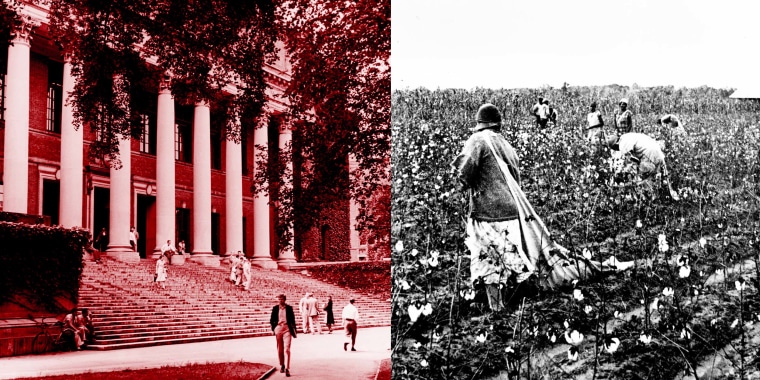On Tuesday, Harvard University released findings from its yearslong investigation into its legacy of slavery.
“Over nearly 150 years, from the university’s founding in 1636 until the Massachusetts Supreme Judicial Court found slavery unlawful in 1783, Harvard presidents and other leaders, as well as its faculty and staff, enslaved more than 70 individuals, some of whom labored on campus,” according to the report. “Enslaved men and women served Harvard presidents and professors and fed and cared for Harvard students.”
The report called for Harvard to use its "intellectual, reputational and financial resources" to attempt to remedy the harms caused by its historical ties to slavery.
Some of the proposed remedies include financial payments to descendants of enslaved people who labored on Harvard’s campus, endowments to fund slavery research, physical memorials honoring the legacy of Black contributors to Harvard’s history, and partnerships with historically Black colleges and universities.

Universities and other U.S. institutions in recent years have begun taking account of their role in slavery and studying potential forms of recompense. As a reminder that these types of arrangements are feasible, Harvard’s report refers to other universities that have taken similar steps, including Brown, Princeton, the University of Virginia and Georgetown.
But it also notes that buying and selling enslaved people wasn't the only way colleges and universities have benefited from slavery.
“[F]inancial entanglements and intellectual leadership that lent universities’ prestige to theories of racial hierarchy have also resulted in lasting harm,” according to the report.
“Each of these forms of culpability — direct participation, financial ties, intellectual leadership, and discrimination — applies to Harvard, where the routine admission of descendants of slavery is a relatively recent phenomenon in a 385-year history.”
Harvard’s push for accountability here comes at a precarious time for its efforts to promote equality and fair access. The Supreme Court, packed with conservative justices confirmed during Donald Trump’s presidency, seems primed to ban universities from considering race during the admissions process — a practice meant to help promote diversity. The case that could sound the death knell involves admission policies at Harvard and the University of North Carolina.
If the policies are struck down, it will be because right-wing legal theorists spent years deviously condemning progressive, race-conscious education policies for being racist when they’re actually designed to curb racism.
That view was the impetus behind the oft-repeated majority opinion Chief Justice John Roberts wrote in a 2007 decision prohibiting a school desegregation plan in Seattle.
“The way to stop discrimination on the basis of race is to stop discriminating on the basis of race,” Roberts wrote, suggesting the desegregation plan violated some students' rights.
But Harvard’s report undercuts that theory, which conservatives gleefully apply to other race-conscious education measures. Harvard has shown that the sins of slavery and racist discrimination in schools bleed through several generations. And even after the practices are technically outlawed, there are reparations to be paid for mistreatment that has never really ended.
Related:
